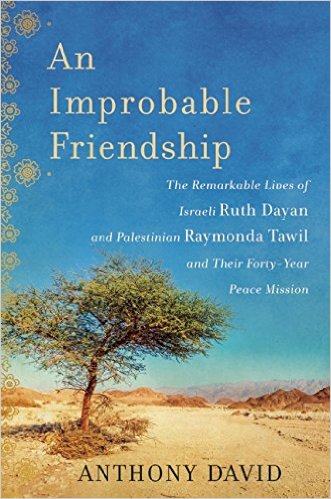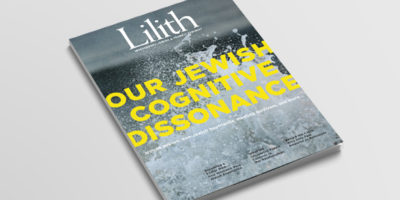“An Improbable Friendship: The Remarkable Lives of Israeli Ruth Dayan and Palestinian Raymonda Tawil and Their Forty-Year Peace Mission,” by Anthony David
 The friendship between Israeli Ruth Dayan and Palestinian Raymonda Tawil — deep, decades-long, not-afraid-to-be-contentious — defied national taboos.
The friendship between Israeli Ruth Dayan and Palestinian Raymonda Tawil — deep, decades-long, not-afraid-to-be-contentious — defied national taboos.
They are powerful in their own right, despite being related by marriage to men whose fame eclipsed their own: Ruth Dayan was the wife (and then ex-wife) of the late, iconic Israeli General Moshe Dayan and Raymonda Tawil was mother-in-law to the PLO’s late chairman Yassir Arafat. Each of these women is a passionate and indefatigable advocate for her own people — and also for recognizing others’ humanity. Still going strong at 98 and 75, respectively, the two friends invited historian Anthony David, author of several scholarly books about Jewish history in Europe and about the Middle East, to write their dual biography: An Improbable Friendship: The Remarkable Lives of Ruth Dayan and Raymonda Tawil and Their 40-Year Peace Mission (Arcade, $24.99).
Tawil’s earliest memories are of the family mansion in Acre. Her father was part of the wealthy, aristocratic Palestinian-Christian Hawa family; her mother, born in Kfar Yassif, was raised in New York and known as a feisty feminist. Tawil attended a Catholic boarding school in the Galilee along with Jewish students. Her family left and lost their home in 1948, and Tawil, eventually moving to Jordan to reconnect with her brothers, married there, later living in Nablus on the West Bank. She now lives in Malta. Dayan’s parents, born in Israel, were classmates at the elite Herzliya Gymnasia, alma mater to many in the pre-and early-state Zionist leadership. Dayan spent some childhood years in England, where her parents studied at the London School of Economics. After her marriage to Moshe, she moved with him to the farming village of Nahalal.
Rich in anecdote and juicy detail, this book demonstrates Dayan’s and Tawil’s creativity, conviction and courage, offering personal glimpses into major historical events. Included are occasions where personal connections yielded exceptions to onerous decrees — such as getting a curfew lifted — as well as many incidents where violence unfortunately was not averted. From her early years, Tawil saw, strategically, that the Palestinians needed to consider the Israeli Jewish left their natural allies, and she was in regular contact with such public figures as Uri Avnery, Amos Kenan and Abie Nathan, even as she opened the first PLO press offices. Dayan worked with Israeli immigrant women, then defied constraints to work with Palestinian women as well to develop and market their traditional handicrafts through her renowned crafts organization and fashion house, Maskit.
As Dayan and Tawil’s story comes to a close in this book, a reader can lament that the wall built to stop the infiltration of terrorists into Israel has separated two peoples whose lives could and should have many more positive connections.
While this authorized dual biography narrates the women’s relationship with what reads as candor, Lilith was curious to know more. We asked Ruth Dayan and Raymonda Tawil if either had experienced any backlash against their friendship — or if they thought perhaps their relationship was easily overlooked, or seen as non-threatening to the status quo, because they are women. Here is what they individually replied:
Ruth Dayan: “Look, for my work with Maskit I was going back and forth across into the West Bank all the time. It was a normal part of my life. In those days there was a lot more mingling than today. There wasn’t a wall, and Moshe took away the old border. Did I ever experience backlash? I don’t remember ever hearing any criticism for my friendship with Raymonda, and of course no one threatened me. Anyone who knew Raymonda’s reputation also knew it wasn’t just a harmless friendship between two women. I don’t think we ever sat down and just talked about our children or whatever. Raymonda always needed something: to get someone out of jail, to help someone else leave the country, or get a permit for one thing or the other.”
Raymonda Tawil: “You must realize that we were under military occupation, and there was a lot of violence in the air. There wasn’t a Palestinian family without someone in jail or in exile. Many Palestinians thought that just talking to Israelis was treason. So, yes, I had to be very cautious with my friendship with Ruth. She was the ex-wife of General Dayan, after all. My God, you can’t imagine what this meant. People were being killed for a lot less. If anything, being a woman made it even more dangerous. Not only was I breaking one taboo by acting on my own as a woman, but I was doing so with Israelis.”



